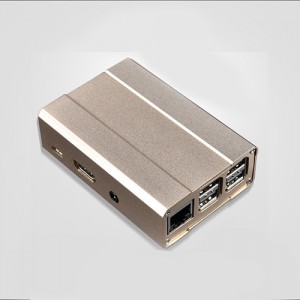Raspberry Pi cases are generally designed to be versatile, accommodating various Raspberry Pi models. However, it's advisable to check the specifications and model compatibility for each case before purchase.
Raspberry Pi Cases
Raspberry Pi Case & Box
A Raspberry Pi case is a protective enclosure designed to house and shield Raspberry Pi single-board computers. These cases not only provide physical protection but also enhance the aesthetic appeal of the Raspberry Pi setup. Available in various materials, colors, and designs, Raspberry Pi cases cater to different user preferences, ensuring the longevity and visual coherence of Raspberry Pi projects.
Price of Raspberry Pi Cases
The price range for Raspberry Pi cases varies based on factors such as material, design complexity, and additional features like built-in cooling systems. While basic cases offer affordable protection, premium options with advanced cooling solutions or sleek designs may have a slightly higher cost. When choosing a Raspberry Pi case, it's essential to consider both the budget and the specific requirements of the project.
Tips for Buying a Raspberry Pi Case
Popular Models of Raspberry Pi Cases
Are Raspberry Pi cases compatible with various Raspberry Pi models, or do I need a specific case for each model?
Do I need additional cooling solutions like fans or heat sinks, or do the cases come with built-in temperature management features?
The necessity for additional cooling solutions depends on the case and the intended use of the Raspberry Pi. Some cases come equipped with built-in features like fans or heat sinks to effectively manage temperature during operation. Premium cases often include these features to enhance thermal performance, crucial for prolonged and resource-intensive tasks. However, for basic computing needs or projects with lower power consumption, a simple case may suffice without additional cooling. Assessing the project's requirements helps determine whether a case with built-in cooling or additional accessories is necessary.
Can I access all the ports and pins easily with the case on?
Most Raspberry Pi cases are designed for convenient accessibility, allowing users to easily reach all essential ports, GPIO pins, and headers even with the case on. Transparent acrylic or ABS cases often provide a clear view of the board layout, simplifying the connection and adjustment of components without removing the case. It's advisable to choose cases with precise cutouts and thoughtful designs that prioritize accessibility to streamline the development process.
What are the advantages of choosing an aluminum case over ABS or acrylic for Raspberry Pi?
Opting for an aluminum case presents several advantages. Aluminum cases offer robust protection, efficient heat dissipation, and a sleek aesthetic. Aluminum conducts heat well, making it beneficial for projects with high processing demands. Furthermore, aluminum cases provide electromagnetic interference shielding. When durability, heat dissipation, and a premium appearance are priorities, an aluminum case proves to be a compelling choice for Raspberry Pi enthusiasts.
Do Raspberry Pi cases affect Wi-Fi or Bluetooth signals, especially in metal cases?
The impact of Raspberry Pi cases on wireless signals varies based on the case material. Metal cases, such as aluminum, may potentially interfere with signals due to their conductivity. However, many manufacturers address this concern with design features or materials that minimize signal disruption. Plastic cases typically have negligible effects on wireless connectivity. To ensure minimal interference, users can choose cases explicitly designed to maintain optimal signal strength.
Can I use a Raspberry Pi case with a Power over Ethernet (PoE) setup?
Yes, many Raspberry Pi cases are compatible with Power over Ethernet (PoE) setups, allowing users to power their boards through the Ethernet cable. Cases designed with a dedicated slot or opening for a PoE hat or adapter facilitate seamless integration. This feature is advantageous for projects where a direct power source may be impractical. Users should look for cases explicitly labeled as PoE-compatible and ensure that the case design accommodates the specific PoE hardware they intend to use. Combining a Raspberry Pi case with PoE capability provides a tidy and efficient solution for both power and data connectivity.
